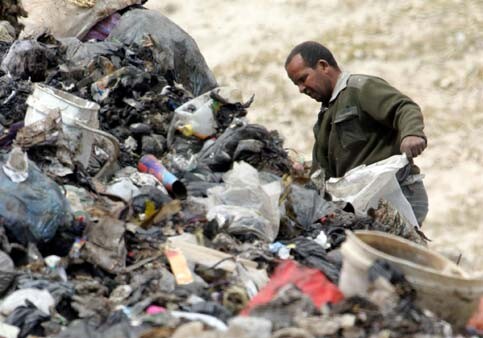Palestinian Center for Human Rights 10 May 2006

A Palestinian man searches for usable things to sell at garbage dump in the West Bank village of Zatara near Bethlehem March 27, 2006. As the Palestinian economy is deteriorating more people is forced to take desperate measures to survive. (MaanImages/Magnus Johansson)
On 27 March 2006, the Islamic Resistance Movement (Hamas) formed the tenth Palestinian government, based on the absolute majority achieved in the Palestinian legislative elections. The elections were fair and transparent, as confirmed by local, regional and international monitoring bodies, which conducted various monitoring roles during the electoral process. Consequently, the Israeli government announced a boycott of the newly-formed government and stopped the transfer of Palestinian tax and custom duties. In addition, a number of donor countries, including the United States of America, the European Union, Canada and Japan, halted financial aid to the Palestinian people and Palestinian Authority.
The international position, and particularly that of donor countries, coincided with a catastrophic deterioration in the humanitarian situation in the Occupied Palestinian Territory (OPT). This deterioration was caused primarily by Israels occupation policies. These policies include economic and social strangulation, threatening Palestinian livelihoods and obstructing the movement of medicines and food, including nutrition for anemic children (i.e. milk and diary products), vaccines, medication for pregnant women, elderly and chronic patients.
The situation arising from the implementation of the Israeli unilateral disengagement from the Gaza Strip, on 12 September 2005, gave rise to a situation that bore serious implications for the economic, social and cultural rights of Palestinians. These conditions increased the rates of poverty and unemployment in the OPT, noting that these rates were already very high. It is feared that the decision of donor countries will prove to be an additional obstacle to fulfilling the economic and social rights of Palestinian civilians (protected by International Humanitarian Law and International Human Rights Law), especially their right to adequate living standards including suitable housing, water, food and healthcare.
The conditions in the OPT has exacerbated the humanitarian situation for Palestinian civilians. Unemployment and poverty rates have increased dramatically. The rate of unemployment is 34% in the OPT as a whole and 44% in the Gaza Strip. This rate rises to 55% during times of complete closure imposed by Israeli Occupation Forces (IOF). Likewise, the poverty rate in the OPT is nearly 50%, with the Gaza Strip rate at approximately 70%. This in turn has impacted the per capita income, which decreased by 32% over the past three years, and is actually 40% lower today than it was three years ago. On the economic front, the gross national product decreased to dangerous levels, threatening the agricultural, industrial, commerce, transportation and tourism sectors.
Unemployment and poverty in the Gaza Strip were aggravated further by destruction of infrastructure in Palestinian towns and villages by Israeli Occupation Forces (IOF), as well as the destruction of production and service sector institutions, including security establishments. Furthermore, IOF destroyed the agricultural sector by uprooting fruit trees, vegetable farms, livestock farms and beehives that made up approximately 40% of the Palestinian gross local product.
Living conditions of civilians in the OPT are regressing further due to the suspension of international aid, which has totaled approximately $US 9billion over the past few years. The situation is complicated further by the Palestinian Authority’s inability to pay the salaries of civil servants in both the civilian and security sectors. The monthly budget of the Palestinian Authority is estimated at $US 165million a month. Approximately 60% of this budget goes to salaries, which support the livelihoods of about one million Palestinians, approximately 25% of Palestinians living in the OPT.
If the situation persists, poverty is expected to increase to about 74%. In addition, per capita income is expected to decline a further 25% below the 2005 level.
This report attempts to highlight the dangers of halting international aid to Palestinians in the OPT, especially in the Gaza Strip. It aims at showing the implications of the donor countries’ decision for the economic, social and cultural rights of Palestinian civilians. This report is a call to donor countries to stop imposing collective punishment on the Palestinian people and to enact the principles of International Humanitarian Law, especially the Fourth Geneva Convention of 1949 relevant to the protection of civilians at times of war. In addition, it is a call to these countries to enact the principles of International Human Rights Law and regional conventions on human rights, including the EU Association Agreement with the government of Israel.
To download the full report (PDF) click here.
Related Links